#esau mccaulley
Text
God’s vision for his people is not for the elimination of ethnicity to form a colorblind uniformity of sanctified blandness. Instead God sees the creation of a community of different cultures united by faith in his Son as a manifestation of the expansive nature of his grace. This expansiveness is unfulfilled unless the differences are seen and celebrated, not as ends unto themselves, but as particular manifestations of the power of the Spirit to bring forth the same holiness among different peoples and cultures for the glory of God.
Esau McCaulley, Reading While Black: African American Biblical Interpretation as an Exercise in Hope
0 notes
Text
The fact that Psalm 137 became a part of the biblical canon means that the suffering of the traumatized is a part of the permanent record. God wanted Israel and us to know what human sin had done to the powerless. By recording this in Israel's sacred texts, God made their problems our problems. Psalm 137 calls on the gathered community to make sure that this type of trauma is never repeated.
~Esau McCaulley, Reading while Black: African American Biblical Interpretation as an Exercise in Hope, 126.
0 notes
Text
"Reading While Black"
McCaulley has a good voice for reading, not wasting words, yet somehow managing to take time to explain. He speaks the truth in a firm, clear, and yet gracious way, from his own life and experience and also as pastor.
#ReadingWhileBlack #McCaulley
Then we reached for Reading While Black: African American Biblical Interpretation as an Exercise in Hope, by Esau McCaulley.
McCaulley has a good voice for reading, he does not waste words, yet somehow he manages to take time to explain. He speaks the truth in a firm, clear, and yet gracious way. He speaks from his own life and experience while also bringing to the table his roles as pastor and…
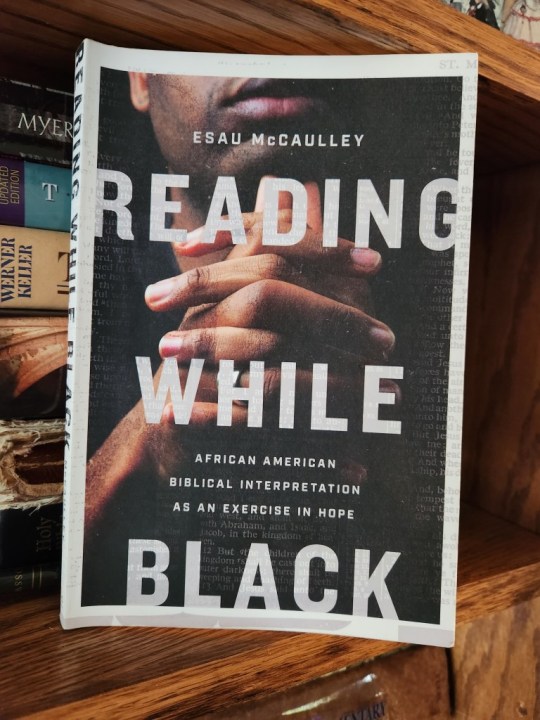
View On WordPress
#african american#black folk#black people#enslavement#esau mccaulley#mccaulley#racism#reading while black#slavery
1 note
·
View note
Text
Book Review: Lent by Esau McCaulley
Book Review: Lent by Esau McCaulley
“Lent” by Esau McCauley is the first in the Fullness of Time series which sets out to be “reflections on the moods, themes, rituals, prayers, and Scriptures that mark each season. These are not, strictly speaking, devotionals. They are theological and spiritual reflections that seek to provide spiritual formation by helping the reader live fully into the practices of each season.” what I expected…

View On WordPress
0 notes
Text
When my body is raised, it will be a Black body. One that is honored alongside bodies of every hue and color. The resurrection of Black bodies will be the definitive rejection of all forms of racism. At the end of the Christian story, I am not saved from my Blackness. It is rendered everlasting. Our bodies, liberated and transfigured but still Black, will be the eternal testimony to our worth.
The question, “What will God do about the disinherited and ripped apart bodies of the world?” can be seen as a central question of religion. Either give me a bodily resurrection or God must step aside. He is of no use to us.
The depiction of the afterlife in which we live apart from our bodies gives physical suffering the final word. If a Black body can be hanged from a tree and burned, never to be restored again, what kind of victory is the survival of a soul? The mob, then, would be able to take something that even God cannot restore. If my cousin’s body can be ravaged by disease and lost to her forever, does that not render illness more powerful than God?
I am often asked what gives me hope to go on, given the evil I see in the world. I find encouragement in a set of images more powerful than the photos, videos and funerals chronicling Black death: the vision of all those Black bodies who trusted in God called back to life, free to laugh, dance and sing. Not in a disembodied spiritual state in some heavenly afterlife but in this world remade by the power of God.
This is the hope that had Black Christians throwing their bodies at wave after wave of anti-Black racism so that their children, even if only for a moment, might rest awhile on the shore. For them, belief in God’s power over death fueled their resistance. It may be a fool’s hope, but I believe that their struggle was not in vain. I trust that all those bodies engulfed in the sea of hatred will one day play with their descendants on a beach, singing the songs of Zion with no more waves to threaten them.
Esau McCaulley, "What Good Friday and Easter Mean for Black Americans Like Me," Opinion piece, New York Times
38 notes
·
View notes
Text
The Half-Truth of America’s Past Greatness.
Esau McCaulley at The New York Times:
Where can African Americans find this lost golden age? Do we discover it during the first centuries of the Republic when slavery was the law of the land? Do we fast forward to the Red Summer, Jim Crow laws and “strange fruit” hanging from poplar trees?
2 notes
·
View notes
Text
• What good is it if only our joys are worthy of sharing and not our struggles? Underlying that courteousness is the fear that acceptance remains conditional. We worry that if we reveal who we really are, what we really think and the difficulties we endure, then we might be rejected. —Esau McCaulley
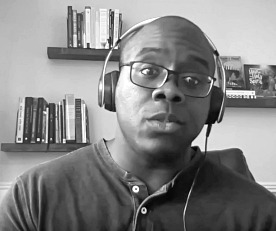
New York Times
New York Times (at Internet Archive)

0 notes
Text
Antonio Velardo shares: Why Arguing Is My Cherished Holiday Tradition by Esau McCaulley
By Esau McCaulley
We lose something when we force ourselves to be polite.
Published: December 25, 2023 at 09:00AM
from NYT Opinion https://ift.tt/m5vz93O
via IFTTT
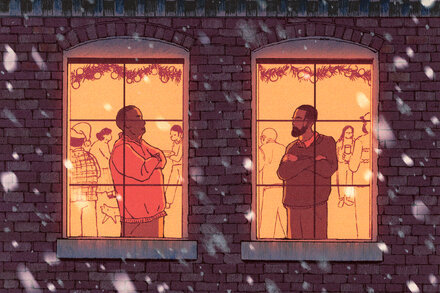
View On WordPress
0 notes
Link
NBA Twitter reacts to LeBron James breaking the 39K point mark: ‘He about to start a new prime’ Lebron James is the oldest player... #usa #uk
0 notes
Text
Esau McCaulley: The Streets Sent Me to the Pulpit
http://dlvr.it/Sw5lHD
0 notes
Text
Euro-American scholars, ministers, and lay folk . . . have, over the centuries, used their economic, academic, religious, and political dominance to create the illusion that the Bible, read through their experience, is the Bible read correctly.” Stated differently, everybody has been reading the Bible from their locations, but we are honest about it.
Esau McCaulley, Reading While Black: African American Biblical Interpretation as an Exercise in Hope
0 notes
Text
Books I've read in 2023:
On First Principles by Origen. Translated by John Behr.
Low Anthropology: The Unlikely Key to a Gracious View of Others (and Yourself) by David Zahl
Luther's Outlaw God, vol. 1: Hiddenness, Evil, and Predestination by Steven Paulson
Luther's Works, vol. 23: Sermons on the Gospel of St. John, Chapters 6-8
Boys and Oil: Growing Up Gay in a Fractured Land by Taylor Brorby
Theology is for Proclamation by Gerhard O. Forde
Luther's Outlaw God, vol. 2: Hidden in the Cross by Steven Paulson
The Annotated Luther, vol. 4: Pastoral Writings ed. by Mary Jane Haemig
Call Me By Your Name by André Aciman
Atomic Habits: An Easy and Proven Way to Build Good Habits and to Break Bad Ones by James Clear
Who is the Church?: An Ecclesiology for the Twenth-first Century by Cheryl M. Peterson
Messianic Exegesis: Christological Interpretation of the Old Testament in Early Christianity by Donald Juel
Luther's Outlaw God, vol. 3: Sacraments and God's Attack on the Promise by Steven Paulson
Ragged: Spiritual Disciplines for the Spiritually Exhausted by Gretchen Ronnevik
The Early Versions of the New Testament: their origin, transmission, and limitations by Bruce Metzger
The Graveyard Book by Neil Gaiman
Confessing Jesus: The Heart of Being a Lutheran by Molly Lackey
Adamantius: Dialogue on the True Faith in God translated by Robert A. Pretty
The Annotated Luther, vol. 5: Christian Life in the World, edited by Hans Hillerbrand
The End is Music: A Companion to Robert W. Jenson's Theology by Chris E. W. Green
Codependent No More: How to Stop Controlling Others and Start Caring for Yourself by Melodie Beattie
The Church Unknown: Reflections of a Millenial Pastor by Seth Green
Reading While Black: African American Biblical Interpretation as an Exercise in Hope by Esau McCaulley
A Guide to Pentecostal Movements for Lutherans by Sarah Hinlicky Wilson
Daily Grace: The Mockingbird Devotional, vol. 2
--------------------------------------------------------
Not listed are some books that I chose not to finish and some books that I have yet to finish.
11 notes
·
View notes
Text
Revelation 14: The Winepress of God's Wrath
Whatever this passage may mean in concrete terms, for its intended audience it was as if the Lord were saying, “I hear your cries, and I see your pain. I have not forgotten you."
#Revelation14 #Winepress #GrapesofWrath
Then I saw, and behold! A white cloud, and upon the cloud one sitting in form and appearance like the Son of Humanity,[1] having upon His head a golden diadem and in his hand a sharp and swift sickle.
And another angel came out of the sanctuary, crying out in a mighty voice to the One sitting upon the cloud,
“Thrust Your sickle and reap, for the hour has come to reap, for the harvest of earth…
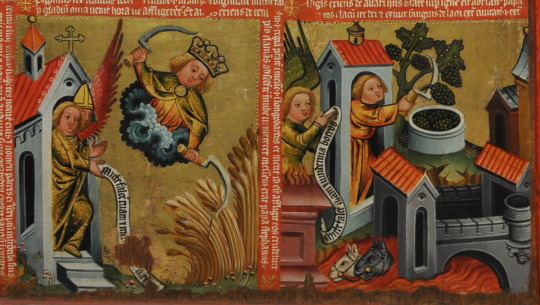
View On WordPress
#esau mccaulley#grapes of wrath#harvest of earth#mccaulley#reading while black#sickle#stade#stadion#stadios#winepress#winepress of God&039;s wrath
0 notes
Text
Esau McCaulley remembers his past, imagine the Promised Land in brand-new book
(RNS)– Esau McCaulley was practically another fact.
As a teen in Huntsville, Alabama, he was sitting in the house viewing tv when a drive-by shooter opened fire on his household’s home. Among the bullets passed a couple of inches from his head. Had he moved a muscle, his life may have been over.
In his brand-new book “How Far to the Promised Land,” due out in early September, McCaulley pictures…
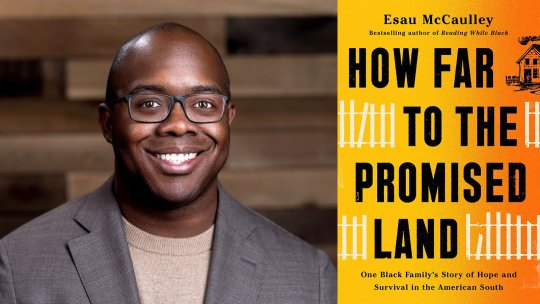
View On WordPress
0 notes
Photo

"Frederick Douglass Knew What False Patriotism Was" by Esau McCaulley via NYT Opinion https://www.nytimes.com/2023/07/03/opinion/july-fourth-patriotism-douglass.html?partner=IFTTT
0 notes
Text
Joyce é uma menina inteligente e autoconfiante que vai ao salão de beleza fazer tranças para a celebração de Pentecostes. Mas ela revela ao pai uma insegurança: sente-se diferente das outras garotas da escola porque seu cabelo é crespo, e o da maioria das meninas que conhece é liso. O homem, então, inicia uma conversa singela com a filha sobre os ensinamentos bíblicos, a negritude e a autoestima.
Em O Cabelo de Joyce e o Espírito Santo, o autor Esau McCaulley aborda assuntos profundos a partir de uma linguagem simples – destinada, principalmente, às crianças negras de origem cristã. Professor universitário e teólogo estadunidense, ele se distancia da ideia de que todos são iguais e convida o público a celebrar as diferenças. Para o escritor, a diversidade é a imagem e semelhança de Deus.
Mas, papai”, Joyce hesitou por um instante. “Por que Deus nos fez diferente?” O papai sorriu e disse, “Nós somos diferentes porque Deus é criativo. Cada um de nós é uma obra de arte única de Deus. (O Cabelo de Joyce e o Espírito Santo, pg. 18)
A obra incentiva o orgulho da identidade negra para combater as consequências provocadas pelo racismo desde a infância. Também mostra, por meio da presença da figura paterna em momentos de autocuidado, o papel dos pais no diálogo sobre amor, representatividade e religião. No fim da obra, Esau McCaulley propõe uma conversa com crianças sobre o respeito às diferenças e a visão de Deus acerca desta pluralidade.
Uma das primeiras histórias no mercado editorial a abordar o racismo na perspectiva cristã e infantil, o livro é publicado no país pela Quitanda. Fundada pelo angolano Tomás Fernando Camba, a editora une o Brasil e a Angola para divulgar obras que tratam sobre cristianismo, negritude e questões sociais.
FICHA TÉCNICA
Título: O Cabelo de Joyce e o Espírito Santo
Autor: Esau McCaulley
Editora: Quitanda
ISBN: 978-65-84780-05-7
Páginas: 32
Formato: 22,86 cm x 22,86 cm
Preço: R$ 58,90
Onde comprar: Editora Quitanda
Sobre o autor: Doutor em Novo Testamento e mestre em Teologia, Esau McCaulley é professor assistente da Wheaton College, em Illinois, nos Estados Unidos. Colunista do The New York Times e apresentador do podcast “Disrupters”, ele percorre questões como racismo e negritude a partir da visão bíblica. Em seus trabalhos, faz interpretações da Bíblia com objetivo de apresentar uma perspectiva multiétnica e social. Entre os livros escritos, o mais recente é “O Cabelo de Joyce e o Espírito Santo”, publicado no Brasil pela editora Quitanda.
Redes sociais do autor: Instagram | www.esaumccaulley.com
Conheça a Quitanda: Instagram | www.editoraquitanda.com
0 notes